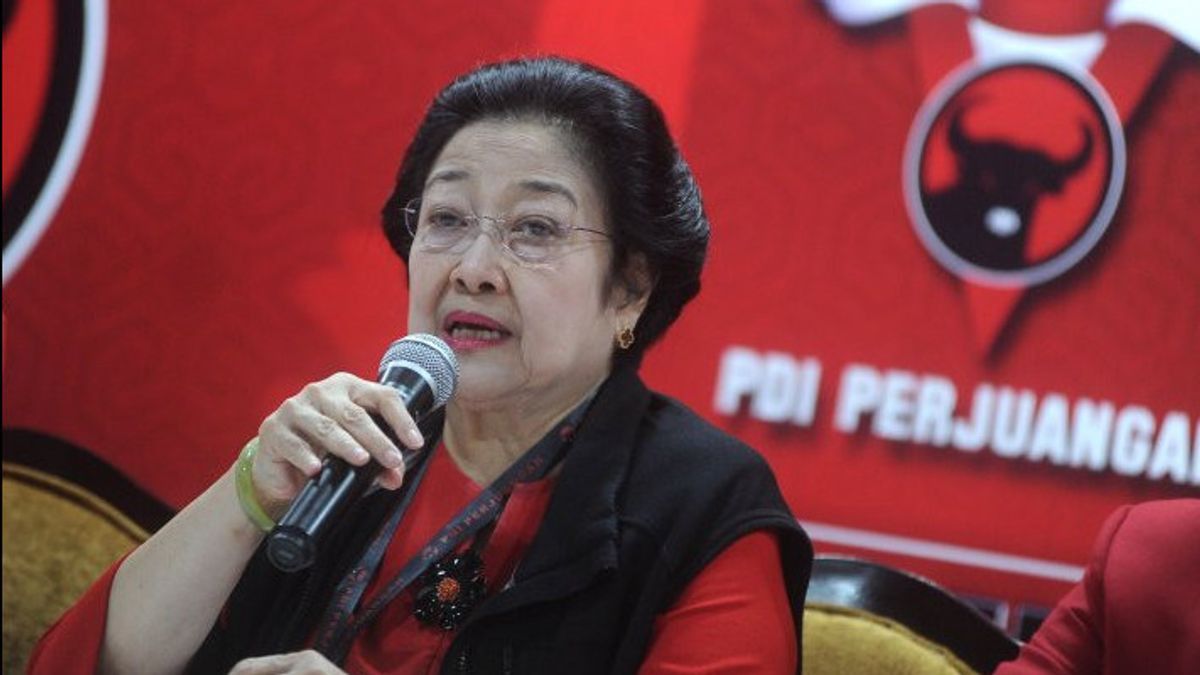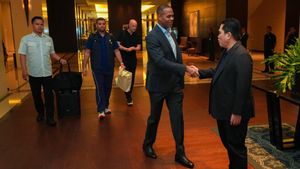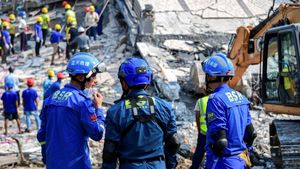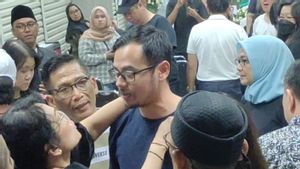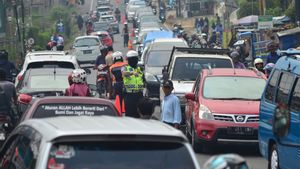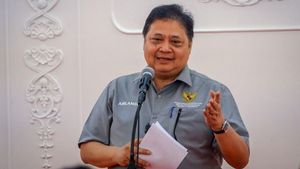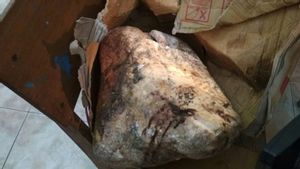JAKARTA - A survey conducted by Puspoll Indonesia ranked the ruling party, PDI Perjuangan (PDIP) as the top in terms of perception of clean political parties and pro-corruption eradication. We remember, Megawati some time ago just admitted her concern about corruption in the pdip body. How did this contradiction occur?
In its release, Puspoll Indonesia noted the public perception of the cleanest political parties from corruption cases and pro-corruption eradication. The top PDIP with a figure of 15.7 percent. Under PDIP there is Gerindra, 10 percent. Third place, MCC (7.8%).
In addition to corruption, puspoll survey also records the electability of political parties. PDIP again tops with a percentage of 22.3 percent. Gerindra and PKB trailed pdip at 13.4 percent and 9.2 percent. After the PKB there was Golkar (8.4%), MCC (7.4%), Democrats (5.3%), Nasdem (4.3 %), PPP (2.8%), and PAN 1.8 percent.
The results of this Puspoll survey are a question, especially in the context of pdip as the cleanest party from corruption and the most pro-corruption eradication. We remember, last February the Corruption Eradication Commission (KPK) caught the defunct Governor of South Sulawesi Nurdin Abdullah in a hand-catching operation (OTT).
Nurdin was then the fourth PDIP cadre to be caught with corruption in the space of six months. In this case Nurdin allegedly accepted bribes. The latest developments, the Makassar Tipikor District Court indicted the contractor, Agung Sucipto for allegedly giving bribes of 150 thousand Singapore dollars and money worth Rp2 billion.
Bribes are made in different places, one of which is done in the governor's office. "So 150 thousand Singapore dollars was given the first bribe in the Governor's Rujab, then the second Rp2 billion that the hand-catching operation was carried out by the KPK," said KPK public prosecutor Muhammad Asri Irwan, in his indictment, quoted Tuesday, May 18.

In the indictment, prosecutors also uncovered a number of evidence, such as several proposal files and various governor's decrees related to infrastructure projects. Everything was signed by Agung Sucipto. In addition, there is also evidence of the flow of Funds Rp70 million to Nurdin sent through the account of Nurdin's wife, Lestiaty Facruddin.
Before Nurdin, we remember one of the most unfortunate corruption cases in the nation's history, involving former Minister of Social Affairs (Mensos) Juliari P Batubara. The minister embezzled money for the procurement of social assistance packages (bansos) COVID-19. Last April, kpk claimed juliari had received a bribe of Rp32.2 billion from the corruption of the COVID-19 bansos.
That figure is double the initial expectation of Rp17 billion. Kpk prosecutors detailed the source of the money, among them from the businessman, Harry Van Sidabukke, whose value is Rp1.28 billion, Ardian Iskandar Maddanatja (Rp1.9 billion), and money worth Rp29.2 billion from a number of companies providing food packages bansos COVID-19.

The parties gave money to be appointed as a provider of COVID-19 bansos. All the money was given to Juliari through two commitment-making officials in the Ministry of Social Affairs: Matheus Joko Santoso and Adi Wahyono. Juliari was sentenced to a maximum of 20 years in prison.
Two names before Juliari --completing the list of four PDIP cadres entangled in corruption cases in the last six months -- are Wenny Bukamo. He is the former Regent of Banggai Laut. Wenny was arrested by KPK for bribery of a project in Banggai Laut Regency. Another, Andreu Misanta Pribadi, ex-PDIP caleg.
Andreu is a former Special Staff of The Minister of Marine Affairs and Fisheries Edhy Prabowo. Andreu turned himself in to kpk after being convicted of involvement in the practice of lobster seed export bribes aka benur.
Megawati's AnxietyThe Chairman of PDI Perjuangan (PDIP) himself had expressed feelings about the number of Bull Party cadres involved in corruption. Megawati said the news made her "unpowered." Megawati's statement was delivered in a virtual halalbihalal event with pdip cadres some time ago.
Those corrupt behaviors, Megawati said, undermined the party's name. Not only historically but also in the contest of national politics. Megawati also reminded the party's target of winning the 2024 election.

"I can't hear if anyone has been arrested for corruption. Tarnished the party name. Must remember the saying, nila a speck of broken milk sebelanga. That's why don't corruption," Megawati said, quoted Wednesday, May 19.
"PDI Perjuangan must remain and continue to flutter as long as this nation exists ... Don't let your guard down. Keep going down. Solid and spirit of work for the people. Continue to strengthen unity because this fight how the ideology of Pancasila continues to be the power of our struggle," added Megawati.
About the Puspoll Indonesia surveyWe contacted the Executive Director of Puspoll Indonesia Muslimin Tanja, the person behind this study. "That's the result of a public perception survey. PDIP electability 22 percent. That means as many as 22 percent of the public choose PDIP if the current election is conducted," he told VOI, Monday afternoon, May 24.
Although clearly this survey raises public perception, but this survey does not delve into where the public perception was formed. "No, mas," said Muslimin answering our question about whether there is news or anything else that underlies that perception?
Muslimin also explained that not everyone who voted for the PDIP believed the party was completely clean from corruption. "Actually, of the 22 percent of PDIP voters, it is also not entirely they judge this party the cleanest because the figure is only 15 percent."
This survey was conducted by Puspoll Indonesia through face-to-face interviews conducted from 20-29 April 2021. A sample of 1,600 is selected and randomized with a multilevel random sample withdrawal method.
Quality control was performed on the interview results, which were randomly selected for 20 percent of the total sample. Puspoll Indonesia said no significant errors were found in the quality control stage.
Political surveysPolitical observer of the Indonesian Institute of Sciences (LIPI) Aisah Putri Budiarti said the survey is basically an important research method to look at the response or assessment or public response to a thing.
In politics, surveys can be used to map public views on candidate electability, political party positions to monitor public views on government performance.
The survey results can be used to improvise institutions, both for political parties and state institutions. "Based on the survey results, evaluation can be done to improve the quality or work of democracy and democratic institutions," Puput --his greeting -- told VOI, Tuesday, May 25.
In practice, surveys can also be used for practical political purposes. There is a strict methodology that survey organizers must meet to ensure surveys get the right and unbiased results.
"But the survey is certainly not easy to do because it is high cost and has strict methodology rules. For example about sample selection, neutral and clear question form, etc. The requirements of this methodology are a very important element to ensure that the survey is correct and unbiased."
"Do not let the political survey then only be used to shape public opinion because it will plunge the public and make the survey no longer in accordance with its original purpose of building knowledge and specifically in the political context to strengthen democracy and its institutions," puput said.
What Puput describes above is how the survey in general is in its basic value as a scientific method. But as explained above, without associating it with puspoll Indonesia survey on PDIP, in fact many political survey results that raise public questions.
In that context, associations and societies of survey institutions need to take part. They can delve into public questions by questioning them to surveying institutions that are members of associations and associations.
"They (associations and associations) have a member code of conduct, so it is binding for its members. And associations or societies can ask their members if there are public questions about their survey research," Puput said.
*Read more information about CORRUPTION or read other interesting writings from Nailin In Saroh, Wardhany Tsa Tsia and Yudhistira Mahabharata.
Other BERNAS
The English, Chinese, Japanese, Arabic, and French versions are automatically generated by the AI. So there may still be inaccuracies in translating, please always see Indonesian as our main language. (system supported by DigitalSiber.id)
